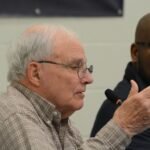Hearings Continue For So. Middlebush Rd. Temple; Lawyer Goes On Attack

A lawyer for some opponents to a proposed 21,000-square-foot temple went on the attack at the April 15 Zoning Board of Adjustment meeting, grilling a temple representative on his sect’s practices, and the need for such a large building.
It was the fifth zoning board hearing for the application submitted by Dada Bhagwan Vignan Institute, which wants to build its temple on a plot of land next to Snyder’s Farm.
This edition featured testimony of Bhupendra Patel, a member of the temple’s Board of Trustees. Patel testified about the proposed temple’s operations.
Patel told the Board that he and his fellow congregants currently lease space in an Edison day care center, and the South Middlebush Road site, of approved, will be the first Dada Bhagwan temple in New Jersey to own its own property.
He said that the current space is home to between 75 and 100 members, and, since the number hasn’t grown much in the past few years, there is no expectation that it will if it moves into the Franklin Township temple.
Patel said that members would come to the temple only on weekends: On three Saturdays a month, the building would be used from 11 a.m. to 8 p.m.; on one Saturday per month, the building would be used from 9 a.m. to 9 p.m.; on one Sunday a month, the building would be used from 10 a.m. to 2 p.m.
Twice a year – once each in the Spring and Summer – the group’s spiritual leader will visit from India, Patel said, On those occasions, the building would be used on Fridays from 6 to 10 p.m., and on Saturdays and Sundays from 9 a.m. to 9 p.m.
Patel said the biggest crowd, between 225 and 250 people, would be in the building on the two Saturdays and Sundays during the spiritual leader’s visits.
During the rest of the year, the one Saturday of a month that the building is in use from 9 a.m. to 9 p.m would see between 125 and 140 people, Patel said.
He said that there are no set service schedules; rather, people come and go as they please, and stay as long as they wish.
How long they stay on a particular day, Patel said, “depends on their interests during the day.”
He said that the temple would not host weddings or funerals, or rent itself for outside events.
Patel said the center is based in Hinduism, but is non-sectarian. Instead, he said, members practice a “spiritual science.”
“This is a unique way of worship,” he said. “Anyone who seeks ultimate salvation can achieve this goal by self-realization.”
It was that hazy definition of the temple members’ belief system upon which Martina Baillie, an attorney representing Ray and John Snyder, owners of Snyder’s Farm, focused during her questioning of Patel.
In questioning him on the temple’s growth plan, Baillie asked Patel if it wasn’t every religion’s desire to grow its congregation over time.
“This is a spiritual science, not a religion,” Patel testified. “The Dada got spiritual knowledge in 1958. He said no need to do the sectarianism. If you see the soul, there is no difference. It is a non-sectarian temple.”
Temple leadership has no intention of growing, he said.
“There are a lot of places in NJ, so people can go wherever they feel comfortable,” Patel said. “Those who are with this, they are comfortable here.”
Baillie then asked Patel why, with such a relatively small membership and no growth anticipated, the plans call for a “large” 21,000-square-foot temple with a 7,000-square-foot worship area, and 35-foot high ceilings.
It was at that point that Peter Lanfrit, the temple’s attorney in the application, objected, saying that temple’s size is irrelevant because the plans conform to what is allowed in the township’s Agriculture Zone, which is where the temple would be located.
” ‘Large’ is a subjective word,” he said.
Baillie then reworded the question, asking Patel for the rationale behind the 21,000-square-foot building.
Patel noted that statues of deities would be located in the main worship area, and that members often dance in front of them.
“… when we perform in front of the deities, we need some space,” he said. “The ladies are dancing in a circle different than the men. We don’t interact. We need space to move around while we are dancing.”
“When the spiritual leader comes, one Saturday a month, we have 125-140 people,” he said. “At that time, we feel we need to please the gods and we need to perform the dance.”
Noting that the height of the building would be seen from South Middlebush Road, and would also be visible from her clients’ farm, Baillie asked, “Is that height o accommodate the deities, or for some other reason?”
“The deities are a certain height, but when you are dancing … you need some open space so you are comfortable,” Patel said.
Baillie made two more attempts to get Patel to explain whether what the members practice is a religion.
“You describe it not as a religion, but as a spiritual science,” she said.
“It’s a spiritual science,” Patel said.
Baillie asked if teh cultural events to be held at the temple would be secular or spiritual, to which Patel replied that the deities would be on a platform during the cultural programs.
Later, Baillie reminded Patel that he said the members don’t practice a religion, “but you’re registered as a 501 ( c)3, so you’ll be treated like any other religion.”
“Hinduism is a part of the religion … the difference here is we are more focusing on the spiritual rather than the ritual,” Patel said. “There are some rituals that you must receive the deity three times a day and do this and do this, all holy festivals you must do this and that. Here it is religion, but the concept is self-religious, study the science.”
“This is the spiritual science, the philosophy of this, within the parameter of Hinduism,” he said. “We believe in reincarnation. This is the spiritual science. The study of spiritual science.”
Baillie also entered into the record a July, 2014 story from the Franklin Reporter & Advocate, in which Shirish Patel, then a member of teh temple’s governing board, said the temple would host up to 300 people several times a week, and that the group would hold morning and evening prayers and large events.
When asked if the temple’s plans had changed since then, Bhupendra Patel said the current membership level is what is being proposed.
A visibly agitated Lanfrit objected again, saying what may have been true in 2014 may not be true today.
Near the end of the session, Lanfrit told the board that the temple is limited as to its membership because the application includes only 150 parking spaces.
“If the temple gets to be of a certain size where the congregation grows, they may have to look into another location, or they have (events) at an alternative location,” he said. “These things can be handled and accommodated.”
The next hearing on the application is set for the board’s May 6 meeting.










































.png)











